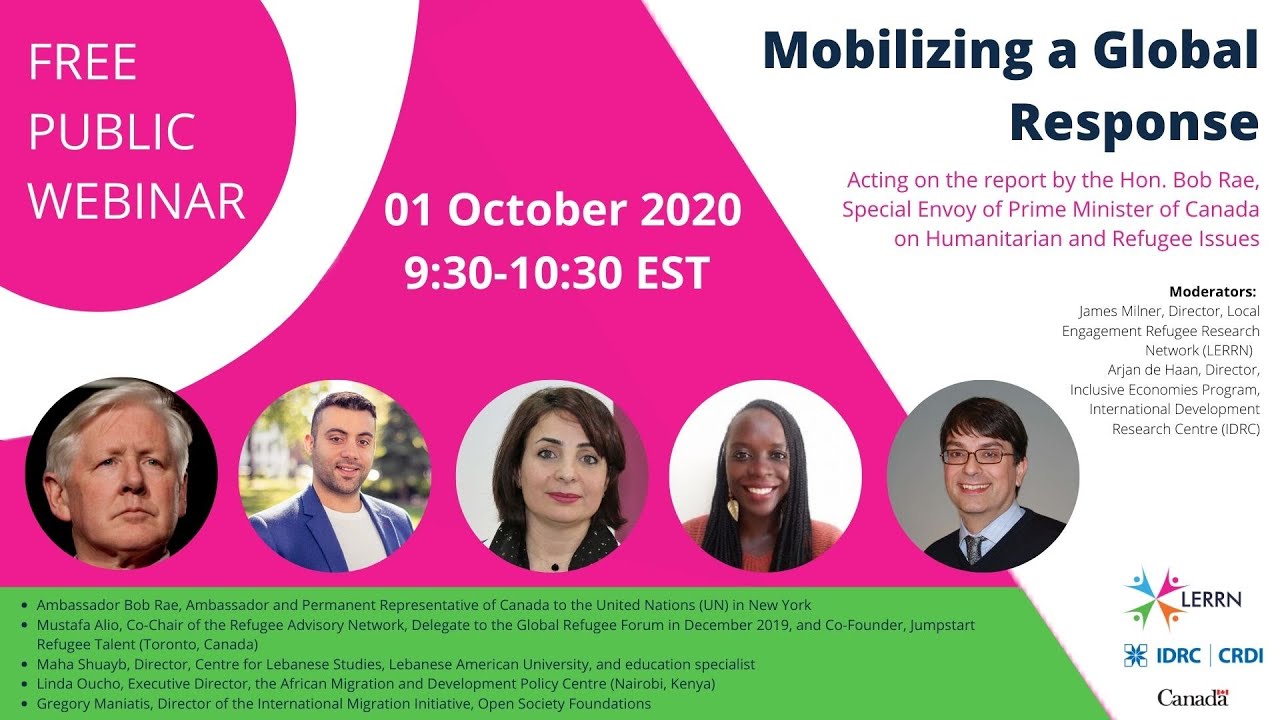On Thursday, 01 October, the Local Engagement Refugee Research Network (LERRN) and the International Development Research Centre (IDRC) hosted a webinar discussing the recommendations brought forth by the Honourable Bob Rae’s report on Canada’s role in mobilizing a global response to the enormous global challenges posed by the COVID-19 pandemic and the specific challenges faced by the international refugee system. The webinar attracted almost 200 participants, bringing together scholars and practitioners from Europe, Africa, the Middle East, and North America. The distinguished panelists Ambassador Bob Rae, Mustafa Alio, Dr. Maha Shuayb, Linda Oucho and Gregory Maniatis affirmed the value of Canadian leadership in the refugee context, which can take many forms including: funding, greater leadership on issues of forced displacement including in Central America, resettlement, complementary pathways, multilateral engagement in peacebuilding, and the promotion of refugee participation.
Bob Rae emphasized, “We need to really begin to recognize that the world is changing, that refugee camps have become permanent settlements, that the voices of refugees need to be amplified and listened to.” Mustafa Alio urged other states to follow the lead of Canada in institutionalizing refugee participation in international delegations and called on actors to normalize refugee participation. Given the protracted nature of displacement, the inclusion of refugee voices is critical in the search for solutions, and there is a need for more opportunities for dialogue involving refugees, host governments, NGOs, international organizations and donors. During the COVID-19 pandemic, refugee-led organizations have demonstrated their value and capacity to respond to important needs in refugee and host communities. The panel affirmed recommendation #7 of Bob Rae’s report, which calls on Canada to financially support refugee-led organizations.
Although humanitarian efforts are valuable, Bob Rae stressed that they’re not enough. “We have to convince people that it’s actually in our interest to create a better refugee system.” Bob Rae identified the need to address the sources of conflict by engaging in conflict resolution, peacebuilding efforts and economic development. Solutions for displacement need to be contextualized for national and local contexts. Over the past 10 or 20 years, there has been a focus on containment and other restrictive policies. However, at some local levels like cities or regions, there is evidence of political will to welcome refugees.
Dr. Maha Shuayb cautioned that localization has recently become a buzzword in humanitarian practice and that it needs to be fully defined and understood to avoid unintended consequences, like reinforcing a Global North containment agenda or providing funding to weak national governments at the expense of local NGOs and refugees which has happened in Lebanon. It is important to establish accountability and examine existing approaches to working with host governments to ensure that localization truly benefits refugees. Furthermore, the panelists argued that we need to build a new political argument in support of refugees, not only using humanitarian and legal language, but also identifying areas where it is in the self-interest of states to work toward solutions for displacement. A political argument will be important for convincing people of the importance and the value of refugee protection.
As Linda Oucho noted, the COVID-19 pandemic offers an opportunity for reflection to identify what is working, where there are gaps and how to pursue change for the future. Gregory Maniatis suggested there’s a need to fundamentally rebuild the resettlement system by opening channels and complementary pathways such as labour mobility and family reunification. There are also important lessons that can be learned by looking at history, including successful examples of multilateral cooperation leading to solutions for large numbers of refugees. Bob Rae argued that Canada should be prepared to seize the opportunities of the current moment to contribute to positive change surrounding issues of displacement, not only now but for generations into the future.
Click here to watch a full recording of this webinar.
LERRN is thrilled to continue the discussions on innovative solutions with and for refugees during the pandemic, and beyond. This webinar was the first in a series of webinars co-hosted by LERRN and IDRC. These monthly seminars will address several dimensions of forced displacement, with an emphasis on the perspectives of partners closest to the issues being discussed. Stay tuned through our website and Twitter as we announce details of the next webinar.
This report was prepared by Yasmine Ghania, LERRN Communications Officer.
